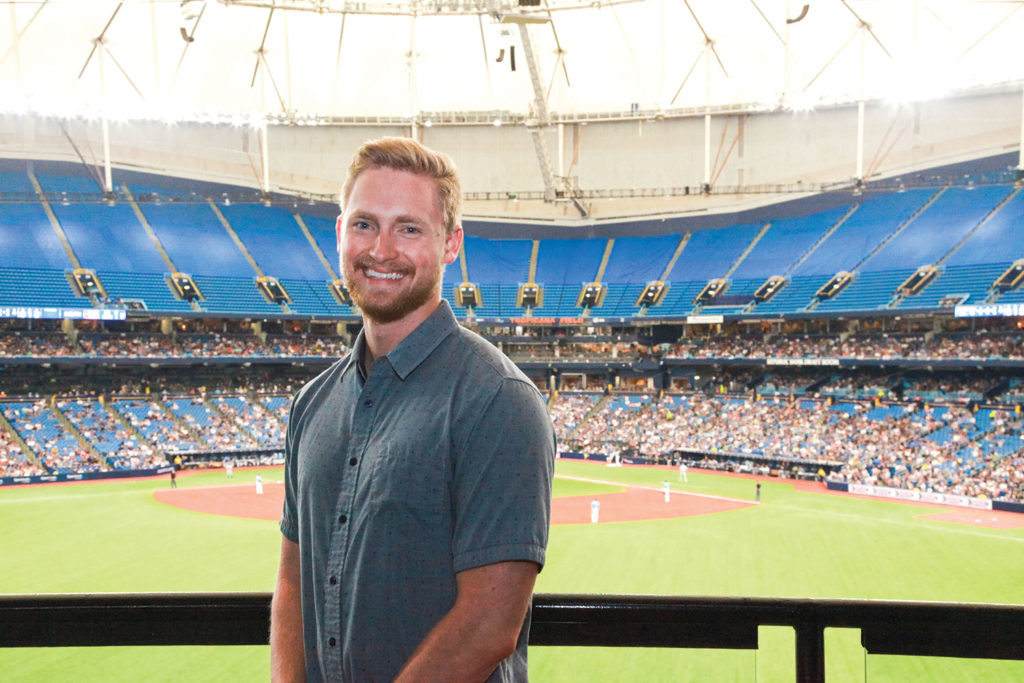“You have more than enough Cheerios.”
It’s 9:30 a.m. at Gaines Elementary School in Athens. The students in Andrea Mooney’s BSFCS ’12 second-grade classroom are working on math, translating equations like 2 x 4 = 8 into words and using Cheerios to solve multiplication problems.
Saba Amirali BSEd ’19, MEd ’19, a master’s student from the University of Georgia’s College of Education, is in the middle of the action, a group of 8-year-olds gathered around her. After assuring one of the boys in the classroom that he didn’t, in fact, need more Cheerios to complete the problems, she moves over to the next group.
Saba Amirali BSEd ’19, MEd ’19 took the Double Dawgs early childhood education track, one of the program’s most popular. She graduated this past summer and is now a fourth-grade teacher at Barrow Elementary School in Athens. (Photo by Peter Frey/UGA)
As one of 174 students pursuing dual bachelor’s and master’s degrees in early childhood education through a Double Dawgs program, Amirali was spending her last spring semester at the elementary school as a student teacher. The Double Dawgs program enables students to earn both bachelor’s and master’s degrees in five years or less. Each program has a specific advisor who provides guidance on admission requirements and coursework that will fast track their multiple degrees. Being part of the inaugural education Double Dawgs cohort, Amirali and her classmates took advantage of the opportunity. With more than 500 students enrolled in over 185 programs, UGA offers students one of the nation’s broadest arrays of accelerated master’s programs. The early childhood education track Amirali graduated from this summer is one of the most popular.
The most obvious benefit of Double Dawgs is the advantage students with dual degrees have in the job market. According to the U.S. Bureau of Labor Statistics, occupations that require master’s degrees for entry positions are growing faster than those requiring only a bachelor’s degree, associate’s degree, or high school diploma. In many fields, the advanced degree translates to upwards of $10,000 more per year in earnings.
Traditional graduate education is expensive, though, typically costing anywhere between tens of thousands to more than $100,000 at some institutions. Double Dawgs allows students to maximize their time as undergraduates and minimize additional debt.
“The subject matter and the courses Double Dawgs students take really make them strong individuals who are ready to be leaders when they leave,” says Elizabeth Saylor, clinical assistant professor, who created the College of Education track with colleague Robert Capuozzo. “I was a public educator in elementary school for 10 years, and I didn’t actually start teaching until I got my master’s as well. I feel like this program is preparing students for what they’re going into.”
That additional preparation is what encouraged Ashleigh Burroughs to participate in Grady College’s advertising Double Dawgs program. Almost immediately after the third-year student’s advisor mentioned the chance to stay an extra year at Grady to get her master’s, Burroughs jumped at the chance.
“I knew that if I said I was going to wait and get my master’s later that later would never come,” says Burroughs, who spends her spare time working as a tour guide for UGA’s Visitors Center, representing the university on social media as a UGA ambassador, and participating in the Public Relations Student Society of America. “I knew it would make me super marketable in any kind of communications job I could possibly want, so I just couldn’t pass up this awesome opportunity.”
“I knew that if I said I was going to wait and get my master’s later that later would never come,” says Ashleigh Burroughs, who is currently involved in the advertising Double Dawgs program in UGA’s Grady College of Journalism and Mass Communication. (Photo by Peter Frey/UGA)
During his four years at Georgia, Taylor Smith BS ’18, MS ’18 was able to earn two bachelor’s degrees (one in math, the other in statistics), a master’s in statistics, and a certificate in applied data science. While working on his degrees, Smith took advanced course loads that prepared him for an internship with the Los Angeles Dodgers and eventually his current position as an analyst for the Tampa Bay Rays after graduation.
“The higher-level mathematical preparation those courses gave me put me in a good place to be able to understand new methodology,” he says. “You can only learn so many methodological tricks and practices in school, but learning the foundation of how to understand the building blocks of probabilities really helps you to see new things and understand them a lot better and a lot quicker than you would otherwise.”
As for Amirali, she’ll be putting her degrees to good use this fall as a fourth-grade teacher at Barrow Elementary School in Athens.
“Looking back, I’ve learned so much more in these master’s classes than I could’ve in undergrad alone,” she says. “That knowledge boost, I can take all that with me into the classroom.”
